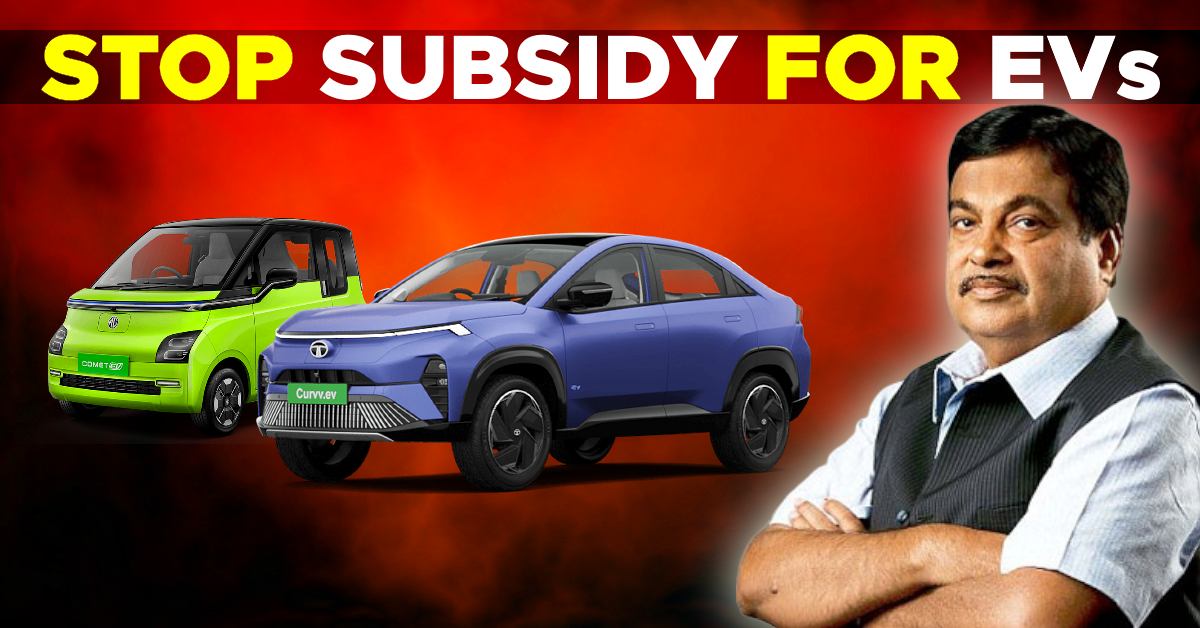Transport Minister Nitin Gadkari: Electric Vehicles Don’t Need Subsidies


The Union Minister for Road Transport and Highways, Nitin Gadkari, has made a significant statement. He recently declared that the electric automotive sector no longer requires government subsidies. While speaking at the Bloomberg NEF Summit, Gadkari stated that the growing demand for EVs, combined with an increase in production volumes, has driven down costs. He concluded that all of these factors make subsidies unnecessary.
During the event, Gadkari emphasized that the EV industry has now reached a point where it can thrive both in the domestic and international markets. It no longer needs to rely on government support. The MoRTH minister also pointed out the tax difference between internal combustion engine (ICE) vehicles and EVs.
He stated that it is already in favor of electric vehicles and offers a considerable advantage. Currently, in India, ICE vehicles are taxed at rates as high as 48%. Meanwhile, EVs enjoy a much lower tax rate of just 5%. According to him, this tax disparity is a sufficient benefit for the EV sector.
He added that the expanding EV market, both within India and internationally, has grown enough. The minister stated that it can now sustain itself without further government intervention in the form of subsidies. “My personal feeling is now we don’t need too many subsidies,” Gadkari stated during the event.
It should be noted that it currently remains unclear whether the minister was referring to subsidies provided under the Faster Adoption and Manufacturing of (Hybrid and) Electric Vehicle (FAME) scheme.
Many experts believe Gadkari’s comments come at a very critical time. Currently, the EV industry is awaiting the launch of the third phase of the FAME scheme. Gadkari’s assertion that the sector no longer needs subsidies could signal a significant policy shift for the Indian government.
In addition to the national slowdown, the Delhi government recently withdrew the waiver of the road tax for electric vehicles. The direct result of this has been a decline in sales figures. The waiver, which was withdrawn on August 31, 2024, led to a sudden 10% increase in the cost of EVs in the national capital.
Industry experts have reported a drastic reduction in sales since the policy change, with registrations in September being almost negligible. According to reports, the price increase has made electric two-wheelers and four-wheelers more expensive than their petrol or diesel counterparts.
It has also been reported that stakeholders are planning to meet with state transport authorities in the coming days to discuss potential solutions. What solution comes out of this meeting will be reported in the coming days.
Although Gadkari’s statement reflects optimism about the future of EVs, we cannot forget that recent sales data suggest that the EV industry is currently facing significant hurdles. Despite the growing interest in electric mobility, sales figures for both electric cars and two-wheelers have shown a downward trend in recent months.
In August 2024, sales of electric passenger cars, SUVs, and MPVs fell to 6,335 units. This marked a 10% year-on-year decline compared to August 2023, when 7,012 units were sold. This also represents the lowest sales figures recorded in the calendar year thus far.
The month-on-month decline is even more stark, with a 19% drop from 7,898 units sold in July 2024. Also, even though cumulative sales for the first eight months of 2024 totaled 62,931 units, reflecting an 18% year-on-year increase, the sharp decline in August suggests that the industry may not yet be resilient enough to sustain itself without subsidies.
Many believe that the sales decline in Delhi and the national downward trend raise important questions about the future of electric vehicle sales in India. Industry experts have already warned that without continued government support, the growth of the EV market could stagnate.
The FAME scheme, which has been a crucial factor in making EVs affordable, is nearing the end of its second phase. Hence, the industry is anxiously awaiting the introduction of FAME 3. If the government decides not to extend these incentives, the sector could face a significant slowdown.
The uncertainty surrounding the extension of subsidies is already reflected in the sales figures. In the electric car segment, Tata Motors, the market leader, sold 4,085 EVs in August 2024, a 14% year-on-year decline compared to 4,777 units in August 2023.
Despite the growth in demand and increasing production capacities, the Indian EV industry is still heavily reliant on government support to maintain its momentum. The tax advantages for EVs compared to ICE vehicles also provide some relief.
However, the high upfront costs and lack of charging infrastructure continue to be barriers for many potential buyers. At this point, Minister Gadkari’s statement has scared off a ton of EV automakers. Whether the government continues giving subsidies to EVs or not will be decided in the coming months.